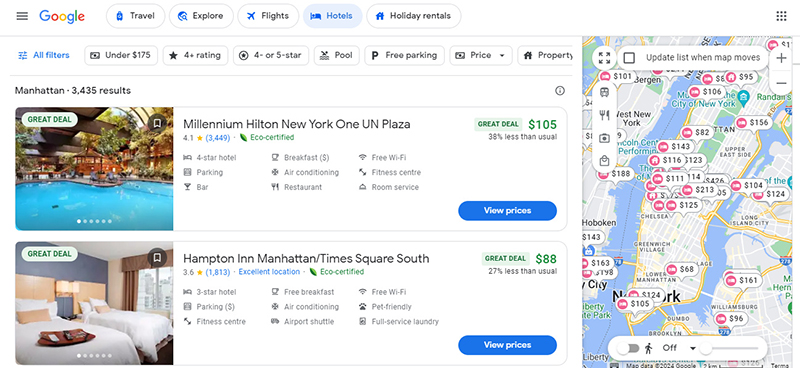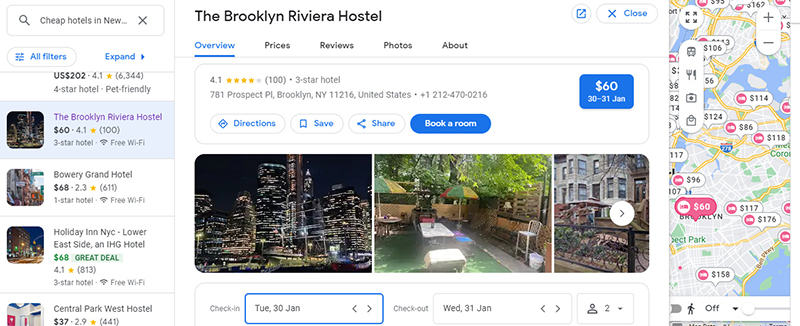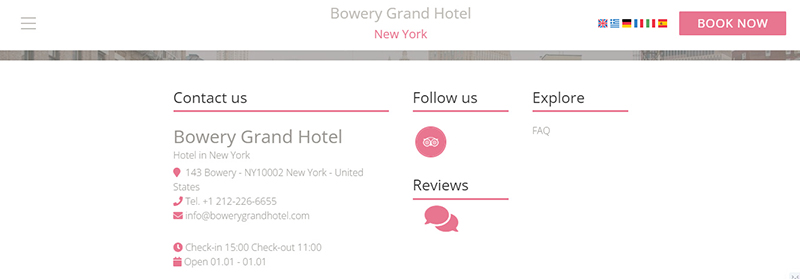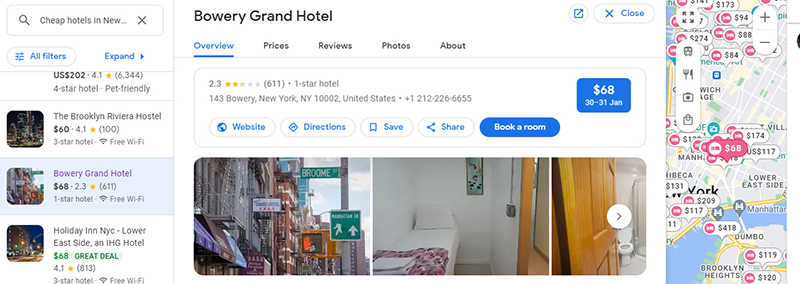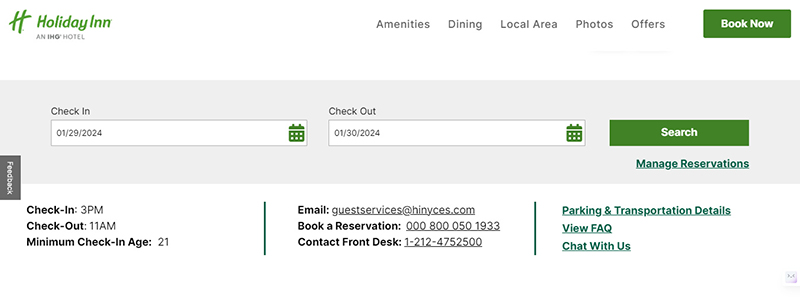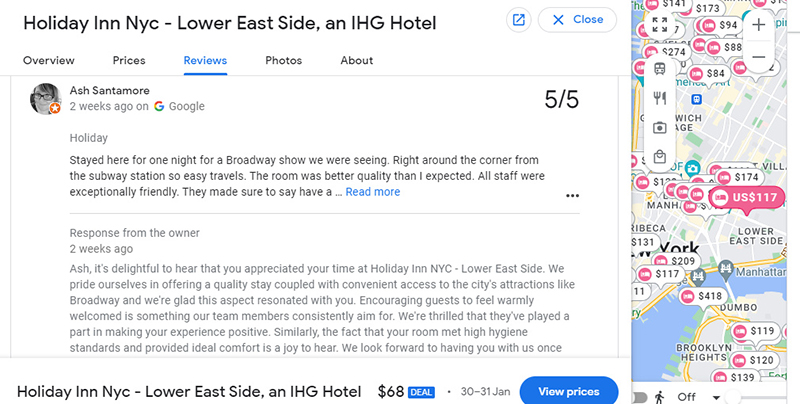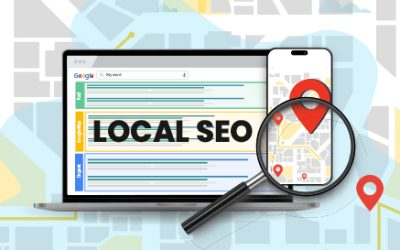Today, most people looking for a hotel or resort start out with an online search. To attract your local community, your property needs to be prominently visible on search engine results page (SERP). With the hospitality sector facing a rise in saturation and intense competition, search engine optimization has becomes essential for hotels aiming to stand out in the crowded market. Local SEO can enhance your business’s visibility forpotential customers in your immediate vicinity. Leveraging reliable organic SEO services can ensure that when individuals search for accommodations in your city or neighborhood, your property prominently features in search results, making it more likely for potential guests to discover and choose your establishment.
What is Local SEO?
Local SEO is process of making a website more relevant to local search results. When people in your locality search for a service you offer, utilizing the right local SEO strategies will make your business visible to them, potentially increasing visitors to your website. On-page optimization and off-page optimization are the two primary approaches to local SEO. Optimizing every piece of a website to perform better in local search results is known as on-page SEO. This entails enhancing titles and descriptions as well as including pertinent keywords and metadata about your company (such category ratings or reviews). With thorough planning and implementation, local SEO can boost your hotel’s local visibility.
Relevance of Local SEO for Hotels
People receive a list of search engine results when they conduct any kind of search. The majority of the time, they will click the website that ranks first on the list because they think it will provide the greatest solutions to their questions.People tend to consider the top-ranked website as more credible and authoritative, and the first result as the most relevant to their query. A Backlinko survey indicates that 31.7 percent of clicks go to the Google result that ranks first. With regard to the final result on the first page, this percentage drops to 2.2%. As you can see, there are very few opportunities to turn to page two. The likelihood is that your audience won’t find you if you are not accessible to them on the first page.
As an important part of search engine optimization, local SEO primarily focuses on bringing organic search traffic to a businesses local store or their online business. In fact, local searches lead to more purchases than non-local searches.As per reports from blog.hubspot.com, 88% of consumers who do a local search on their Smartphone visit or call a store within a day. In fact, nearly 46% of all Google searches are seeking local information. This means, people are looking for you locally, and they are ready to take action when they find you.
SEO for hotels is all about ensuring that the website is recognized as a credible, trustworthy resource. It can dramatically increase the direct bookings, at a fraction of the cost of paid advertising. According to Google’s research (https://blog.hubspot.com/marketing/local-seo-stats), 4 in 5 consumers use search engines to find local information. For example, a search for “Hotels Near Me requires Google to know where the potential guest is located (their geographic location), identified by IP address or cell phone location. Google can then serve up results related to their individual location.
Furthermore, searches like “Hotels in Downtown Chicago do not rely on the businesses address to be found because the search term provides the location. The results from these types of searches will differ from other searches as Google will section of the search engine results page often referred to as the Local Pack.
Local SEO Tips
- Enhance Discoverability – The hospitality industry (particularly the hotels and restaurants) are one of the most customer centric industries that has maximum interaction with customers. In fact, this is the specific industry wherein the customers have a wide range of options. Therefore, it is imperative for hotel businesses to be available for their customers at all times. Building or having a strong presence in all the local directories as well as the neighboring directories is crucial. Nevertheless, a cross-presence in relatable industries may help in pushing up the rankings on the SERPs.
- Optimize Website Content and Structure – Optimizing your website’s content and structure involves focusing on the following aspects –
- Doing Proper Keyword Research – Generally, a hotel website may rank organically for a number of terms through location and naturally creating content. However, going by exactly what your specific target audience is searching for can help take your website to the next level in terms of building long lasting traffic, bookings and brand loyalty
- Update Accurate Information – Being available for your customers in one important aspect of local SEO for hotels. This simply means, customers should be able to find you at all times when they conduct a search. This can be ensured by providing accurate information in your citations. Showing real-time updates as much as possible without making mistakes like, avoiding simple spelling errors in your NAP information. Which ultimately can have a negative effect on your rankings, and bookings; through confusing the search engine bots.
- Post Content with a Local Focus – To grab the attention of tourists as well as your local people, you may want to consider Posting localized content based on your local area. Creating local content will do two things; promote your rooms and hotel services, and also non-commercial supporting content. For non-commercial supporting content, this will assist in increasing the relevancy of your hotel website as both a hotel and its association with the geographical area.
This is a perfect strategy for hotels as tourists and locals will be updated on community, festivals, museums, and restaurant updates. Dedicating a page to sights in your city or highlighting popular restaurants and shopping in your neighborhood are a few different ways to include localized content in the hotel website. Moreover, including localized content will improve your property’s local search ranking, while also providing your website visitors with the local information they want to see before making a booking.
Focusing on local information on your website allows tourist and the locals to gain all the information they need without leaving the website. This will in turn have a positive effect on your hotel and its bottom line.
For instance, “The Holiday Inn Albuquerque shows off the best of the area in the “Things To Do page of their Vizlly website. The page offers detailed information and links to the local university, convention center, popular restaurants, golfing, skiing and everything a tourist would wish to see. Not only will a local or tourist stay longer on the site but Google will see you as an authority or a valid resource to share with others around the world looking for this location’s local information. Search engine results page often referred to as the Local Pack.
- Ensure UNAP Consistency – UNAP stands for URL, Name, Address, and Phone Number. In fact, it is essentially a property’s online identity. Search engines do not just look to a hotel website and business listing for information about the location and services; they also scan hundreds of other sites and directory listings for information. If any of these listings are inconsistent, they may not trust the information and are less likely to show the hotel website in search results.
- Optimize Title Tags and Meta Descriptions – Title tags and meta descriptions are important as these are the ones that entice a customer to browse your website. They provide a good opportunity in determining how Google ranks your content. As title tags are limited by pixel width (easier to measure in terms of characters) your brand/hotel name can be used for targeted keywords and brand name. Meta descriptions on the other hand, do not directly influence rankings, but can impact click-through rates. Make sure your Meta descriptions or information is short, crisp, and concise. Use the primary keyword to arouse an interest in the minds of the customers to visit the website.
- Utilize “Google Business Profile and ensure it is updated – A favorite tool for business and leisure travelers, Google Maps will increase your hotel’s exposure and give you the power to manage how your hotel appears on Google Maps. If tourists or locals can’t find your website on the map, they are going to miss out on bookings. “Google My Business allows you to –
- List your hotel’s name, address, and phone number
- Display photos of the hotel, rooms, and facilities
- Display guest reviews and also respond to guest reviews
- Give additional details relevant to travelers looking for information, such as Wi-Fi, disabled access, etc
Ensure your business is verified, as this significantly increases its likelihood of appearing in local search results.Compared to non-certified businesses, verified businesses are more likely to appear in local search results on Google Search and Google Maps.Perform a Google search for your hotel if it remains unverified. Select the “Own this business?” option situated beneath the property’s knowledge graph. Subsequently, Google will provide you with alternatives to validate the listing. Once your hotel listing is confirmed, you gain the ability to enhance its visibility by updating the following details.
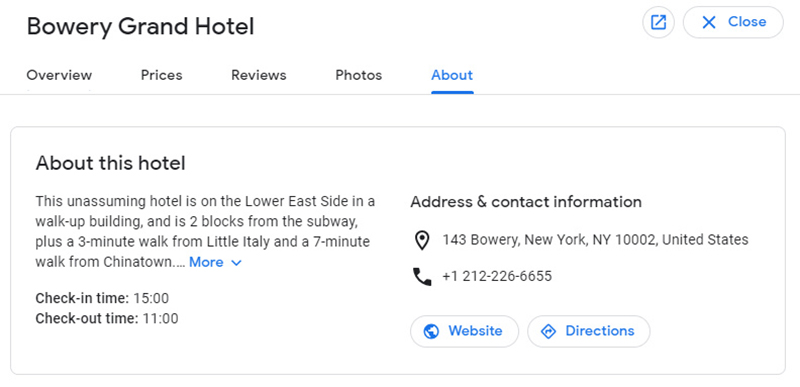
- Build Local Links – Building organic links on other websites that point to your hotel’s site is one of the most important SEO aspects. Try to get links from websites that you wish to get associated with. Conduct some research of local clubs, festivals, arts, and businesses and build relationships with them to generate more high-quality backlinks to your website. Always keep in mind that the key is to only link to or get links from sites that your hotel wants to be associated with and which makes sense for your property.
- Optimize User Journey and Booking Process – Optimizing the user journey and booking process on the website helps bring more relevant and qualified traffic to the website. Optimizing the booking/inquiry process for users to maximize the website’s potential requires focusing on the following key factors –
- Make CTAs Clear – This is an important factor to focus on; however, there are many websites where the contact link is in the footer and there are no clear Call-to-Action (CTA) on the key landing pages.
- Update Contact Forms and Payment Gateways – Websites need to keep the booking process and forms to a few pages and clicks as possible. It is estimated that forms with fewer fields can have a 65 percent higher conversion rate on mobile. Users are more likely to complete the booking if there are fewer clicks.
- Improve Page Loading Speed – There is a strong correlation between pages loading fast and user abandonment rates. According to an article published in Marketing Dive, a new research by Google suggest that 53 percent of mobile users abandon sites that take more than 3 seconds to load. Make sure to optimize images and file sizes for mobiles to avoid high abandonment rates.
Do you have business at multiple locations?
Read our blog post to learn
how to create a Winning Local SEO Strategy for Multiple Locations
- Reply to Reviews : Google is aware that consumers want to read reviews before deciding on a specific product. Thus, it should come as no surprise that Google’s local ranking algorithm takes reviews into account.Take note of reviews on your listing and reply to them, positive or negative. This not only makes your listing more visible in local searches, but it also shows potential consumers that you appreciate their business by placing a high value on your listing. Adapt your answer to each review specifically. Additionally, avoid using too many keywords in your comments and refrain from asking reviewers to include keywords in their evaluations. Here are some quick tips to get reviews:
- Send a shareable review link in an automated email during their stay and/or at check-out.
- Send a push notification via your hotel’s mobile app at checkout.
- Post signs in the hotel rooms and throughout the hotel.
- Conduct a social media campaign targeting recent visitors
- Provide a review link on your website
- Post in High-Quality Photos and/or Videos : Having high-quality photos and videos of the rooms and facilities will help set your hotel apart from the competitors. Utilize both external and interior media assets to showcase the qualities your hotel has to offer. It’s crucial to remember that anybody can upload images to your listing. So, periodically review the images in your listing and identify any that are inaccurate representations of your property.
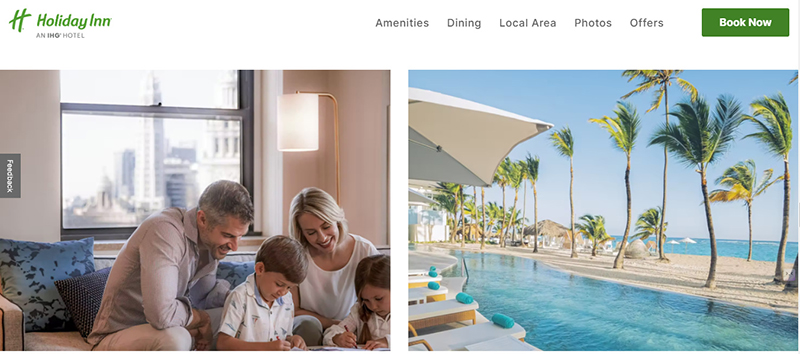
- Social Media Marketing – Social media pages are the best place to announce promotional offers, rebates, and attractive deals online. Create an attractive social media page for your hotel. Share important as well as casual information via these social media pages and use these platforms to link up with other pages. Try to upload pictures of the various services your hotel offers, such as wedding reception halls, catering activities and providing space to corporate and executive level meetings, and so on.
- Examine the Rest of your Online Citations and Directories: All online directories and citations should have the same version of your URL, name, address, and phone number. This covers locations such as Foursquare, Hotfrog, Yelp, Apple Maps, and Bing Places.In reality, Google gathers data for your Google Business Profile by searching publicly accessible online sources. It is advisable to ensure that the information displayed in these spaces is accurate just to be safe.With just one click, Moz Local is an excellent solution for data synchronization and monitoring across several web directories. If you intend to handle local citations by hand, Whitespark offers a useful directory of well-known citation websites for hotels that are frequently visited by tourists. Learn additional details, advice, and how-tos here.
Partner with us to tailor a customized strategy for your hotel.
Following the above-mentioned strategies can help generate local SEO traffic for your hotels. However, with constant Google updates, users demanding high quality service, and continuously optimizing hotels local SEO it can be difficult. But always remember providing great customer service while providing Local SEO tactics, this will have a long-term impact on the success of your hotel. An experienced local SEO service company, we’ll customize your experience to your liking ensuring that your site is visible to the right audience.


